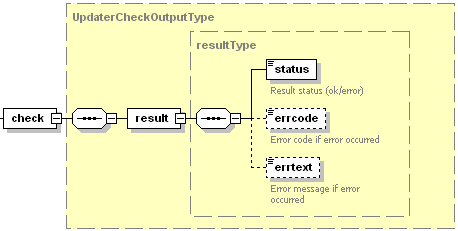Checking Updater Status
The check operation is used to show current status of Plesk Updater. If it is installing a component or updating Plesk, the other operations are unavailable.
Request Packet Structure
A request XML packet retrieving status of Plesk Updater includes the check operation node:
<packet version="1.5.0.0">
<updater>
<check/>
</updater>
</packet>

Note: The interactive schema navigator for all request packets is available here: http://plesk.github.io/api-schemas/1.6.8.0/agent_input.svg.
The check node is required. Data type: none.
Response Packet Structure
The check node of the output XML packet is presented by type
UpdaterCheckOutputType (updater.xsd) and structured as follows:

Note: The interactive schema navigator for all response packets is available here: http://plesk.github.io/api-schemas/1.6.8.0/agent_output.svg.
- The result node is required. It wraps the response retrieved
from the server. Data type: resultType (
common.xsd). - The status node is required. It specifies if the Plesk Updater is not busy. Data type: string. Allowed values: ok | error.
- The errcode node is optional. Is returns the error code if the check operation fails. Data type: integer.
- The errtext node is optional. It returns the error message if the check operation fails. Data type: string.
Samples
This request retrievs status of Plesk Updater:
<packet version="1.5.0.0">
<updater>
<check/>
</updater>
</packet>
Response:
<packet version="1.5.0.0">
<updater>
<check>
<result>
<status>ok</status>
</result>
</check>
</updater>
</packet>
If Plesk Updater is busy, the response packet from the server will look as follows:
<packet version="1.5.0.0">
<updater>
<check>
<result>
<status>error</status>
<errcode>1035</errcode>
<errtext>Service is busy</errtext>
</result>
</check>
</updater>
</packet>